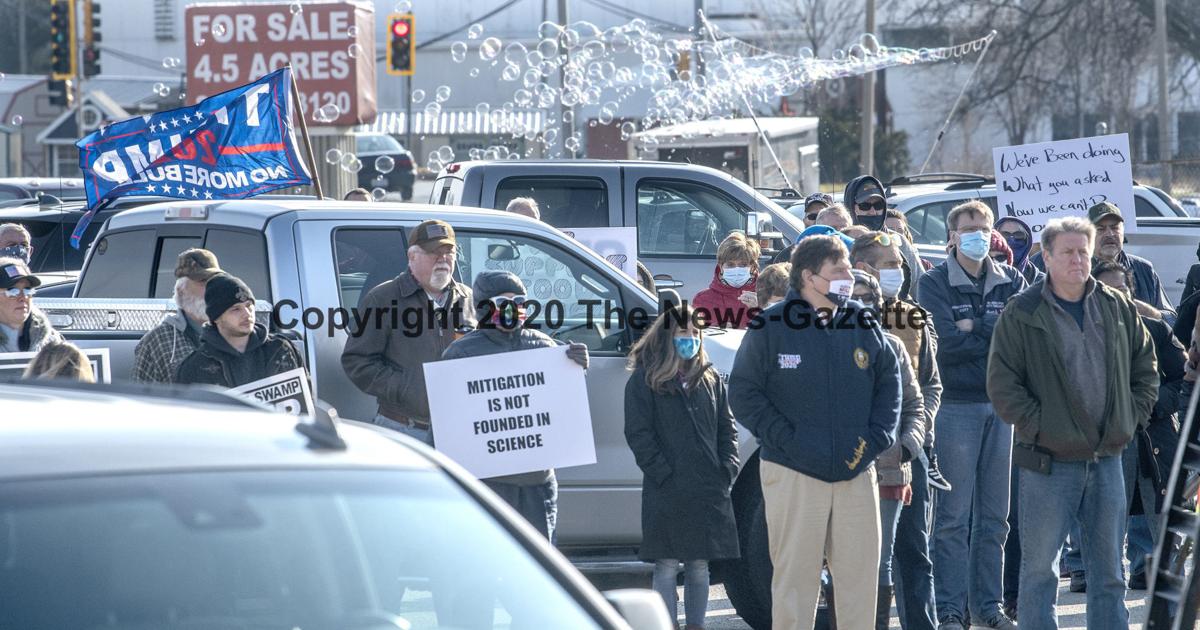
CHAMPAIGN – Annie Easterday held a simple message sign outside the Champaign-Urbana Public Health District in Champaign on Saturday morning.
It said, “We did what you asked. Now we cannot pay our bills. “
The businesswoman who co-owns Pear Tree Estate in rural Champaign struggled to express her feelings about a pandemic that is clearly beyond her control.
Their wedding venue company has had 74 cancellations since March, resulting in 10 full-time and 40 part-time employees out of work.
‘It’s hard to put into words. We have not tried to get around the rules. I don’t want to pretend we’re against the health department. We haven’t had a job for nine months now. We have to find a way to get help, ”she said.
Easterday was one of approximately 100 people who came to the Kenyon Road public health district offices to support restaurant, bar, hotel and other hospitality workers who wanted answers to the question of why their industry appears to be taking the brunt of the COVID burden.
“The rules … are putting people out of work, even though we are one of the safest communities,” said Dave Jones, president of One Main Development, which owns several buildings in downtown Champaign. “We have eight restaurants (in our buildings). Half is closed, the other half barely works. “
Jones and others at the meeting, including 51st District Senator Chapin Rose, R-Mahomet, cited figures that put Champaign County’s seven-day positivity rate for COVID at 1.8 percent (including tests on the University of Illinois campus), well below the the governor’s threshold of 8 percent for mitigation requirements, which began on November 20.
“It doesn’t take a CPA to understand that 1.8 is less than 8,” Jones said.
Excluding UI testing, the formula the state uses, the seven-day positivity rate on Saturday for region 6 – 21 counties, including Champaign – remained at 8.4 percent.
Jones said only five of Illinois’s 102 counties appear to be enforcing the restrictive rules regarding a ban on indoor dining.
“Why do we send residents to other states to dine? This community has done the tests. We realize that COVID is a serious health risk, “but” the arbitrary and aggressively enforced “rules ignore the psychological toll on restaurant owners, Jones said.
Julia Rietz, Champaign County State attorney, responded that “as difficult as it is economically, in the interests of public health, (enforcing the rules) is the right thing to do”,
Rose was critical of Pritzker for not adhering to his own rules and not counting the tests performed at the user interface in determining the region’s positivity rate.
He said he is working on legislation to release about $ 100 million to small businesses of the $ 750 million he says the state has for COVID assistance.
Tom Briski from Urbana showed up to support Kathy and Jim Flaningam, the owners of Apple Dumplin ‘in Urbana, who were also in attendance.
“People must have the right to choose. I am not going to attend the funeral of my independence, ” said Briski, who said he missed Friday’s fish special at Apple Dumplin ‘after a judge agreed with the public health district on Thursday that the restaurant should not remain open. to eat inside.
Jim Flaningam said on Saturday that he still hadn’t decided to play.
“I’m a destination,” he said of the restaurant on High Cross Road, on the northeast side of Urbana.
“The reason people come is for camaraderie and interaction. We have customers who call the restaurant when their family members cannot reach them. We are as well known for our service as our food, ”said Jim Flaningam.
Mahomet’s Gary Longfellow, who described himself as ‘common sense’, suggested that ‘everyone should just take a break’.
“They are hesitant,” he said of state regulations that seem to be changing daily. “Don’t tell me I can go to the mall or Walmart with hundreds of people, but not my friend Jim’s dining room with 30 people.”
Dick Adams of Champaign is a fan of the Original Pancake House. He doesn’t understand why a “50 degree tent is safe, but being in a building that is cleaner than when it was new” is not.
“There are so many contradictions in the way this is handled. I care about the (affected) people, ”said Adams. “I just want my ham and eggs.”
Savoy’s Scott Tapley, a former Champaign County Board member working as a wealth planner, said he came to support the business owners “who were struggling over unnecessarily harsh regulations.”
“I am sympathetic to people who lose their jobs, their livelihoods for reasons beyond their control and probably not necessary,” he said.
The event organizers urged people to donate to the Champaign County Hospitality Relief Fund established through the Tourism Office to help unemployed workers.
Donations can be made online at visitchampaigncounty.org/foundation/hospitality-relief-fund.
The agency accepts nominations from entrepreneurs whose employees need the help most. Among the fund’s backers were the Chamber of Commerce and the Champaign-Urbana Hotel Lodging Association.